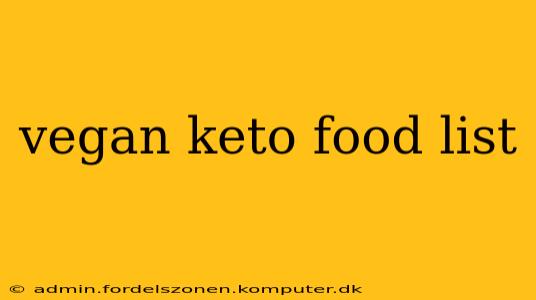Embracing a vegan ketogenic diet might seem like a paradoxical challenge, but it's entirely achievable and surprisingly delicious! This comprehensive guide provides a detailed list of vegan keto-friendly foods, along with tips and tricks to help you navigate this unique dietary approach. We'll also address some common questions surrounding this lifestyle.
What is a Vegan Keto Diet?
A vegan ketogenic diet combines the principles of veganism (excluding all animal products) with the ketogenic diet (severely restricting carbohydrate intake to force the body into ketosis). This means focusing on high-fat, very-low-carbohydrate foods derived entirely from plants. Ketosis is a metabolic state where your body burns fat for energy instead of glucose (from carbohydrates). While challenging, this approach offers potential benefits like weight loss, improved blood sugar control, and increased energy levels for those who can successfully maintain it.
Vegan Keto Food List: What You CAN Eat
This list is divided into categories for clarity:
Healthy Fats: The Cornerstone of Vegan Keto
- Avocados: Rich in healthy monounsaturated fats and fiber.
- Coconut Oil: A staple for cooking and adding to smoothies. Use it sparingly, as it can raise cholesterol levels in some individuals.
- Olive Oil: Excellent for salads and cooking at lower temperatures.
- Nuts and Seeds (in moderation): Almonds, macadamia nuts, Brazil nuts, chia seeds, flax seeds, hemp seeds (be mindful of carb content; portion control is key). Limit your intake as many contain a decent amount of carbs for keto.
- Nut Butters (in moderation): Almond butter, cashew butter, macadamia nut butter (check labels carefully for added sugars and carbohydrates). Again, watch your portion sizes here.
- Vegan Butter Alternatives: Look for options with low carbohydrate counts.
Low-Carb Vegetables: Add Flavor and Nutrients
- Leafy Greens: Spinach, kale, lettuce, arugula. These are incredibly low in carbs and high in nutrients.
- Cruciferous Vegetables: Broccoli, cauliflower, Brussels sprouts, cabbage (consume in moderation, as they contain more carbohydrates than leafy greens).
- Other Low-Carb Vegetables: Asparagus, zucchini, bell peppers (green peppers have the lowest carbohydrate content), mushrooms, celery, cucumber.
Other Vegan Keto-Friendly Foods:
- Shirataki Noodles: These noodles are almost entirely carbohydrate-free and have a neutral taste. They're great as a pasta substitute.
- Soy Products (in moderation): Tofu, tempeh, edamame (be aware of carbohydrate content, as soy products can vary widely).
- Coconut Flour: Great for baking low-carb breads and muffins.
- Chia Seeds: A good source of fiber and omega-3 fatty acids, however, be mindful of your portion sizes.
Vegan Keto Food List: What You SHOULD LIMIT OR AVOID
- High-Carbohydrate Fruits: Bananas, mangoes, grapes, apples, oranges, etc.
- Legumes: Beans, lentils, peas.
- Grains: Rice, wheat, oats, corn.
- Starchy Vegetables: Potatoes, sweet potatoes, corn on the cob.
- Most Vegan Processed Foods: Many contain hidden sugars and starches. Read labels carefully!
- Excessive Amounts of Nuts and Seeds: These can quickly add up in terms of carbohydrates.
Frequently Asked Questions about Vegan Keto
How many carbs can I eat on a vegan keto diet?
The recommended carbohydrate intake for ketosis varies, but generally, it's between 20-50 grams per day. It's crucial to track your carbohydrate intake meticulously, at least initially, to see how your body reacts.
What are the potential benefits of a vegan keto diet?
Potential benefits may include weight loss, improved blood sugar control, increased energy levels, and potential improvements in certain health conditions (always consult a healthcare professional).
What are the potential challenges of a vegan keto diet?
It can be difficult to meet your nutritional needs, especially vitamin B12, and requires careful planning and meal preparation. Nutrient deficiencies are possible, so supplementation is often recommended. It may also initially be difficult to find meals that satisfy and keep you in ketosis.
Is a vegan keto diet right for everyone?
No, it’s not. Individuals with certain health conditions should consult a doctor or registered dietitian before starting any restrictive diet, including a vegan keto diet. It is highly recommended to have regular checkups to monitor the impact of this diet on your overall health.
This comprehensive guide offers a strong foundation for embarking on a vegan keto journey. Remember to consult with a healthcare professional or registered dietitian before making significant dietary changes, especially if you have any underlying health conditions. They can help you create a personalized plan to ensure you're meeting your nutritional needs while staying in ketosis. Good luck and enjoy the delicious possibilities!
